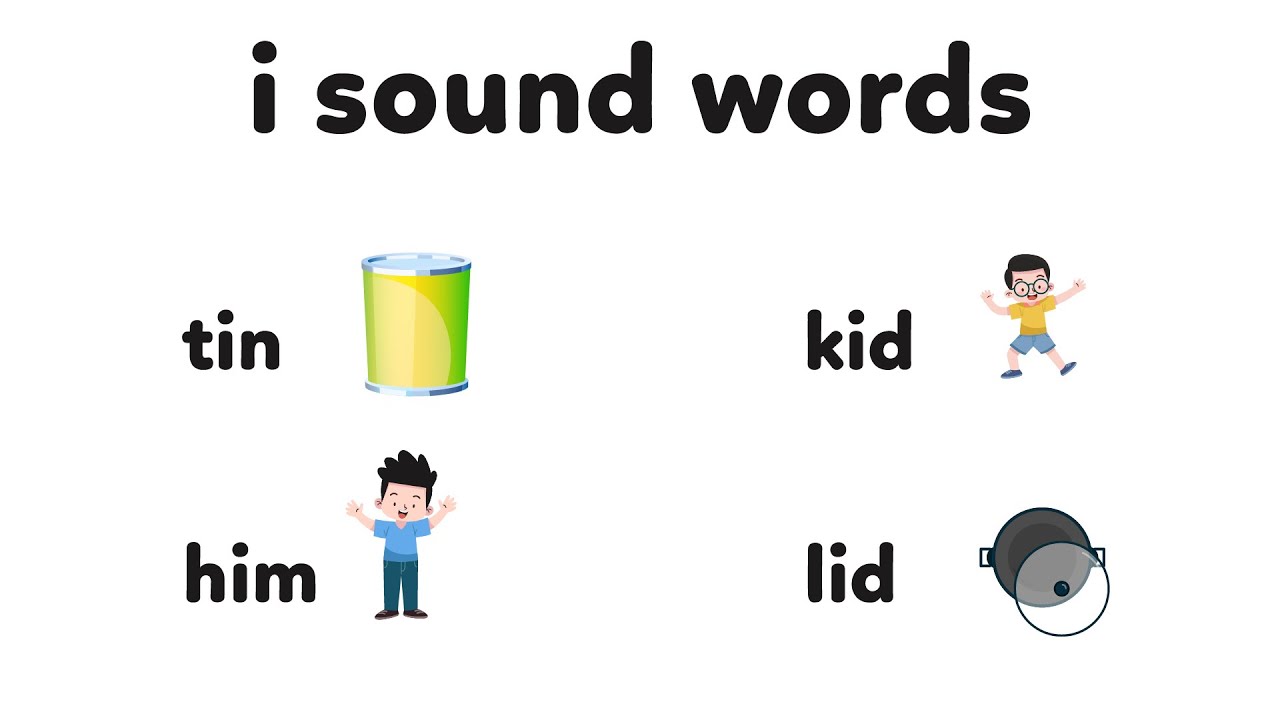I Sound Words: Word Lists, Stories, and Activities
📌 Contents
- What are the short I sound words?
- How to read the Short I sound Words
- Short I word families
- Short, decodable text
- Free short vowel decodable passages
- Short vowel decodable books
- Practicing Short I words
🔤 What is the short I sound?
Vowels in English can be long (say their own name) or short (make a quick sound). For beginning readers, short vowels are often introduced first because they appear so frequently in simple words.
The short I sound (ĭ) is the sound you hear in words like “sit,” “pig,” “lid,” and “him.” To make this sound:
- Relax your lips slightly
- Place the front of your tongue in the middle-top part of your mouth
- Say a quick “ih” sound.
👉 Because some accents make short I and short E sound similar (bit/bet, pin/pen), it’s helpful to exaggerate the difference when teaching. Try using a mirror so children can see how the mouth shape changes.
📖 How to read the short “i” sound
New readers first encounter short I in CVC (consonant-vowel-consonant) words like
- pig
- fin
- lid
- sit
As their skills grow, they’ll read short I in blends and digraphs. hs:
- fish
- list
- spin
- sing
🏡 Short I word families
Word families help children notice patterns in spelling and sound. Here are common short I families:
- -ib → bib, rib, nib
- -id → lid, did, grid
- -ig → pig, wig, dig
- -im → rim, him, slim
- -in → pin, win, spin
- -ip → lip, sip, drip
- -it → sit, hit, spit
- -ix → fix, mix, six
- -ill → fill, hill, chill
- -ink → sink, link, pink
- -ish → fish, wish, dish
- -ist → list, mist, twist
⚠️ Note: Words like bird or girl look like short I words, but they’re actually part of r-controlled vowels (neither long nor short).
📘 Vocabulary Quiz – Test Your Knowledge
Multiple Choice Questions (MCQs)
Choose the correct option:
-
The word “benevolent” means:
a) Cruel
b) Kind and generous
c) Angry
d) Weak -
The word “Eloquent” refers to someone who is:
a) A poor speaker
b) Silent
c) Fluent and persuasive in speaking
d) Confused -
“Frugal” means:
a) Wasteful
b) Careful with money
c) Rich
d) Generous -
“Audacious” best describes a person who is:
a) Bold and daring
b) Shy
c) Lazy
d) Simple -
“Transient” refers to something that is:
a) Permanent
b) Temporary
c) Strong
d) Fixed
Fill in the Blanks
- She gave a very __________ speech that inspired the whole audience.
- A __________ person spends money carefully and avoids waste.
- His __________ nature made him popular among his friends.
- The rainbow is a __________ beauty of nature.
- The king was known for his __________ rule.
Match the Words with Meanings
| Words | Meanings |
| 1. Magnify | a) Brave, bold |
| 2. Audacious | b) To make larger or bigger |
| 3. Benevolent | c) Temporary |
| 4. Transient | d) Kind and generous |
| 5. Eloquent | e) Fluent and persuasive speech |
Part D—Short Answer
- Write a sentence using the word “frugal.”
- Create your own definition of “audacious.”
- Use “transient” in a sentence.
✅ Answer Key (for teachers/learners to self-check):
- MCQs: 1(b), 2(c), 3(b), 4(a
- Fill in the Blanks: 1. Eloquent, 2. Frugal, 3. Benevolent, 4. Transient, 5. Benevolent
- Match: 1(b), 2(a), 3(d), 4(c),
📚 Short, decodable text
CVC Sentences
- The lid is in the bin.
- Jim did a big jig.
- Tim hid six bibs.
With consonant blends
- The wind lifts the list.
- The twins spit in the sink.
- Tim did a spin.
👉 These simple sentences give children practice decoding while reinforcing short I spelling patterns.
✍ Free Short Vowel Decodable Passages
Parents and teachers often ask for decodable stories with real plots. To support learners, many educators share free short I passages that use only short vowel words plus a few high-frequency sight words like the, to, and.
Stories like these allow children to experience reading for meaning while staying within their decoding level.
📗 Short Vowel Decodable Books
For structured practice, decodable readers are invaluable. Books like:
-
Swim, Tim—a short I reader that uses only short I words and a few sight words.
These readers build mastery through repetition and pattern recognition, helping children gain confidence before moving on to other vowel sounds.
🎲 Practicing short “i” words
Here are some fun Short Here are activities you can try at home or in the classroom:
- Sorting Game
- Write CVC words on cards (mix of all short vowels).
- On the back, add a matching picture.
- Have children say the word aloud, identify the vowel sound, and place it in the correct vowel pile.
- Sentence Drawing
- Ask children to read a short sentence (e.g., “The pig did a jig”).
- Have them draw what they read.
- This reinforces comprehension along with decoding.
- Word Family Ladders
- Write a base word like sit.
- Change one letter at a time → sit → sip → tip → tin → win.
- Repetition Practice
- Use decodable books like Swim, Tim that repeat short “i” words for fluency.
🧠 Final Note
The short “I” sound is one of the foundation stones of early reading. By practicing with word families, decodable sentences, and fun sorting activities, children gain both fluency and confidence.
👉 Once your child masters short I, they’ll be ready to tackle other short vowels and move toward more complex reading patterns.
50 New Words and Meanings
Explore a curated collection of 50 fresh English words, each accompanied by a clear, modern definition that brings your vocabulary to life. From expressive slang to nuanced neologisms, this list features terms like delulu (a playful take on “delusional”), skibidi (a nonsensical pop-culture staple), tradwife (celebrating traditional domestic roles), broligarchy (tech-bro power elite), and brain flossing (creative mental downtime). Perfect for writers, learners, or anyone eager to stay linguistically current, these selections tap into digital culture, evolving social trends, and language innovation—making everyday conversation more vibrant and relevant.






[…] “I sound words” are essential in building vocabulary and improving pronunciation. Words with the […]